By Sean Casteel
We live in an age where we take things like podcasting for granted. Although we can likely be said to still be in our “digital infancy,” we have come to rely on the idea that our home computers can give us easy and free access to a world of Internet radio shows that focus on their niche audience – in our case, for true believers in UFOs and the paranormal.

Set-up for podcast
But let us first look back a little at how podcasting came to be. In an excellent online article by Stephanie Ciccarelli, we are told: “Podcasting, once an obscure method of spreading information, has become a recognized medium for distributing audio content, whether it be for corporate or personal use. A podcast is similar to a radio program with key differences. Listeners can tune in to their favorite shows at their convenience and listen to podcasts directly on their iPod or their personal computer. The term ‘podcast’ is derived from the media player, ‘iPod,’ developed by Apple, and the term ‘broadcast,’ the traditional means of receiving information and leisure content on the radio or television. When the two words were merged, the terms ‘podcast,’ ‘podcaster,’ and the art of ‘podcasting’ were born.”
Some trace the technology of podcasting – first known as “audio-blogging” – back to the 1980s, before the advent of the World Wide Web, when a company called Radio Computing Services (RCS) began to provide music and talk-related software to radio stations in a digital format. In 1993, the early days of Internet radio, Carl Malamud launched “Internet Talk Radio,” which was the first computer-radio talk show, each week interviewing a different computer expert. It was distributed as audio files that computer users would fetch “one-by-one.”
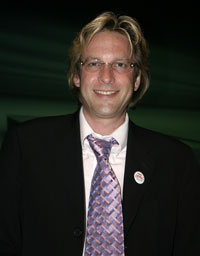
Adam Curry
But podcasting as we know it today is often said to have begun around 2004 and is credited to Adam Curry, a former MTV video jockey, who worked with the cooperation of RSS feed developer Dave Winer. Together they created a sophisticated method of broadcasting that makes audio content available to listeners at their convenience in an “always on” state. From there, other developers came along who improved the code and started their own programs.
“When people discovered that they could create and host their own radio shows” Ciccarelli writes, “a community of pioneer podcasters was born.”
Among those newly born of podcasting is our own Timothy Green Beckley, who hosts, along with his cohost Tim R. Swartz, a podcast talk show called “Exploring the Bizarre” that is heard every Thursday night on the KCOR Digital Radio Network. The various shows are also archived at the KCOR website and on YouTube if you want to catch up on what you’ve been missing.
 “Exploring the Bizarre” has been fairly successful in podcast terms, and Beckley can now offer advice for those who may want to follow in his footsteps.
“Exploring the Bizarre” has been fairly successful in podcast terms, and Beckley can now offer advice for those who may want to follow in his footsteps.
“I always say,” Beckley began, “if you’re going to do a podcast, you’d better make it good, make it professional, because otherwise you will never have an audience. Especially today. There are so many shows out there that there’s no reason to listen to something if it’s of an inferior quality.
“When podcasting started out,” he continued, “some of the broadcasts were just totally unprofessional. The stream would go out every five minutes or so. You’d be having a conversation with the host and all of a sudden they weren’t there anymore.”
Beckley also warned that all forms of quality control are crucial and cautioned against using a free service like Blog Talk Radio for your own show.
“You get what you pay for,” Beckley said. “Some of these services – which may be free – the quality is so bad that you may as well not even bother to do a show at all. I’ve been on some of these shows, which I now refuse to do, where you could actually hear other broadcasters in the background because they would be simultaneously broadcasting other shows. So you’d get all this noise over your telephone.”
There have been other similar incidents of botched broadcasting, including one that Beckley feels is nearly comic.
“I was on a station out of the Four Corners region,” he recalled, “which is where Utah, Nevada, Arizona and Colorado meet. It was a show on UFOs, Bigfoot, things along that line. The host had five guests on, which is probably something that shouldn’t be done either. If you’re going to have five guests, people are going to talk over each other. Let’s say you’ve got five male voices, a lot of times you won’t know who is talking. So it defeats the purpose.
“Anyway, I was one of the five guests on the program and it was a Blog Talk Radio show. So Blog Talk would give you a phone number to call and they would patch you through to the person who was hosting the program. There was some kind of switchboard or something that they have. You were given a special ID number or PIN number to punch in once you got through to Blog Talk and mine just would not go through. The PIN number was not accepted. After trying a good ten times, I just gave up and said, ‘The heck with this.’
“Well, about 15 or 20 minutes into the program,” Beckley continued, “the host says over the podcast, ‘Jeez, Tim, you’re always a very talkative guest, but we haven’t heard from you at all.’ Of course, the reason they hadn’t heard from me was because I couldn’t get through to the station. I don’t think they realized through the whole hour of the program that I just wasn’t there. Totally unprofessional. Not on the part of the host but on the part of the free service, who would routinely have problems like that.
“Again, you get what you pay for. If you expect something for nothing, you’re probably going to get nothing for something somewhere along the line. So I just decided that if I was going to do this, I wouldn’t be on a program unless it at least had a minimal amount of professionalism about it. The guests had to be heard and the host had to know something about the subject.”
For those interested in starting their own podcast, Beckley freely offers more advice.
“You should gear a program to what you do best,” he said. “Let’s say if you’re a contactee or a channeler or something, you want to try to attract that audience. Don’t go for the whole world. It’s a very specific niche market out there. You should listen to other broadcasts, especially those that have been on the air for a while, so that you can see pretty much what’s going on.
“You should have decent equipment,” he continued. “You don’t have to spend thousands of dollars on this. But it’s best to use Skype because the voice quality is 50 to 100 percent better than if you’re talking on a landline. Except in extreme cases, never use a cell phone. Because if people try listening to your program once or twice, and the sound quality of your broadcast is obviously subpar, they are not going to tune in again.”
Podcast talk shows are often short-lived, Beckley said, adding that “There are maybe a dozen that have lasted more than a brief period of time.”
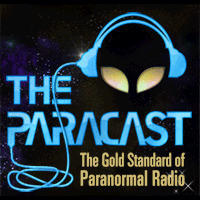 As one of the rare success stories in the field, Beckley points to “The Paracast,” operated and hosted by Beckley’s friend Gene Steinberg.
As one of the rare success stories in the field, Beckley points to “The Paracast,” operated and hosted by Beckley’s friend Gene Steinberg.
“Gene goes back to the relatively early days of podcasting,” Beckley said. “He does everything pretty well and he’s a good host. He has fairly decent guests on, although I’d like to choose a little bit bigger variety than Gene would. He’s got well over 200 programs now that are archived and very easy to find. Another advantage with Gene’s show is that you don’t have to rummage through a website to find out how to turn on the program live. It’s always accessible and available. If it’s not live when you listen to it, you can find it in the archives.
“In addition to Gene’s ‘The Paracast,’ you’ve got Tim Binnall and his show ‘Binnall of America.’ He’s been on for I think about nine seasons now. He does a very adequate job. He has guests not just on UFOs, although he always has Stan Friedman on around Christmas. But he has other offbeat guests. He’s even had people on talking about the Columbine school shooting and the conspiracy that might be involved there. He’s a very good, dedicated host.
“Another one of my favorite programs is Greg Bishop’s Radio Misterioso, which is on Sunday nights. The only thing I don’t like about Greg’s program is that it takes him it seems forever to put shows in the archive when we want to listen to them right away. But he has a very good show, very good guests.”
Along with applauding his personal favorites, Beckley pointed out that there are now a huge variety of similarly-themed podcasts available.
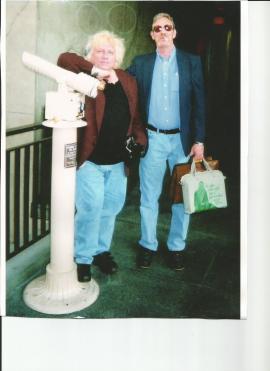
Tim Beckley and Sean Casteel
“Every subject you can think of involving UFOs and the paranormal can be found somewhere on the Internet in a podcast,” he said. “And not only podcasts that are audio, but there are some that are actually broadcast as if it were a TV station. Now that’s a little harder to do. It takes a little bit more sophistication and it’s usually done by someone unpolished. It’s done, again, using Skype, which can be your friend or it can be your total enemy, depending on how it’s working that night.”
Beckley next touched on what he feels is a truly crucial element of podcasting: archiving the show for listeners who never heard the original live broadcast.
“If you’re going to do a show, let’s be frank, most people are not going to tune in when you do it live,” he said. “They are not going to remember that your show is on, say, Thursday nights at 10 o’clock Eastern Time. That happens to be the time that my program that I cohost with Tim Swartz, ‘Exploring the Bizarre,’ is on the KCOR Digital Radio Network. But if people forget they can listen live at 10 P.M. Eastern Time, 7 P.M. Pacific, they can always go back and listen to an archived version of the show.”
In Beckley’s case, KCOR has an archived version up within twelve hours after the live show. The shows are also put up on YouTube, which gives the programs the potential of drawing thousands of additional listeners.
Meanwhile, having a limited live audience is also a factor when it comes to listeners calling in.
“If you don’t have a large audience,” Beckley cautioned, “you’re probably only going to get a handful of phone calls, if any at all. So don’t expect to be inundated by people calling to ask questions. Only if you have a very large audience, if you’re Coast To Coast or Jimmy Church, are you going to have enough phone calls that you can devote 20 minutes or half an hour of your program to the listeners. That’s just the way it is.”
Which again demonstrates the importance of archiving shows after they’ve been heard live.
“And it has to be archived,” Beckley emphasized, “so that people can FIND the darn thing. There’s nothing worse than wanting to listen to a program and not being able to locate it. Or you find the program but you have to go from the host’s website to some other site to listen to it. You’re going to lose a lot of people right there because they’re just not going to spend 15 or 20 minutes trying to figure out how to listen to your show.”
Choosing the right guests is another important factor.
“You’ve got to have on decent guests,” Beckley said, “that people want to hear. You should not try, however, to rely on just your old-time favorites. You know, your Nick Redferns and Preston Dennetts and so forth. You should go out and try to find guests that are not that well known and develop them. That’s what we do on ‘Exploring the Bizarre.’ I find people in all walks of life. People send me emails. I look on Facebook all the time where I’ve got about 4000 friends. I’m always looking to see who they are and what they might have to say that’s new. We have found some really good guests that way and we will now have them on on a regular basis.
“I usually start by having someone on as kind of a ‘panelist.’ Then, if they go over well and are well-spoken and have some good information, I will invite them back again.”
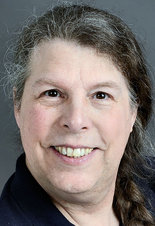
Cheryl Costa
Beckley said one his favorite guests has been Cheryl Costa, who writes an online newspaper column for The Syracuse New Times and is considered to be the chief historian of UFOs for the Empire State. Costa appears on Beckley’s program on a regular basis, as does Allen Greenfield, a well-known author on paranormal topics and a member of the hierarchy of the Gnostic Church.
“If we don’t have Allen Greenfield on every six or seven weeks,” Beckley enthused, “we’re missing a good time. I’ve known Allen since about 1963 or 1964. He is a marvelous guest. He is well-versed in many topics and he has a great sense of humor. He’s the type of guy you’d like to invite over for a couple of beers and a good conversation.”
There are many other things to consider about choosing one’s guests.
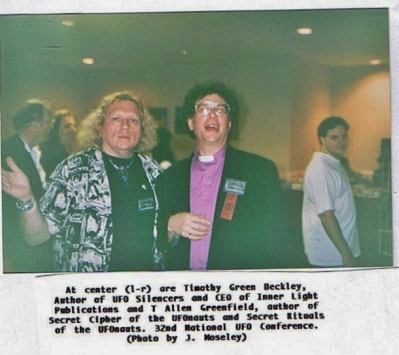
Tim Beckley and T Allen Greenfield
“You’ve got to find a balance,” Beckley explained, “between serious researchers who have something new and interesting to say and people that are exciting and entertaining so that listeners will tune back in. Because if all your guests are dull or too scientific or too much this or too much that, people get bored with it. If a particular author has a new book out and he’s been on ten shows in two weeks’ time, chances are people are not going to tune in and listen to that person if they’ve already heard them two or three times.”
Once a given guest is on the show, Beckley said it is important to ask pointed questions.
“If something new has happened or you see evidence that points you in another direction,” he advised, “then bring it up in the conversation. Don’t be afraid to ask pointed questions of your guests, because nobody wants a pushover. You don’t have to be rude, but you should get to the bottom of the mystery. That’s the only way we’re ever going to find any solution, by asking serious questions.”
Beckley says he does only minimal research in preparing for an interview.
“If it’s somebody who’s got a new book out,” he said, “I don’t want to know everything about it. I want to go in there and ask questions that I am curious about getting answers to. I think I’m a pretty good host and I can ask the questions that my listeners are interested in finding out answers to. In fact, in a good percentage of the comments I get from listeners, they say, ‘This guy knows what questions to ask.’
“And the same with my cohost, Tim Swartz. People say, ‘Why do you have a cohost?’ First of all, you want a little diversity of opinion on a program. Also, too, if your Skype or your telephone goes down, it’s good to have a backup voice. Who wants to get cut off and have dead air? So it’s not a bad idea to have a cohost with you.”
Beckley also recommends spending no more than an hour with a single guest unless it’s someone who can really converse deeply and has a lot to say.
“I can cover a lot of territory in just an hour,” he said, “and if a guest has more to say I can always invite them back later on down the road.”
Choosing the right network to join is also a priority. At one point, Beckley was using a particular network that he declines to name.
“We had some technical problems,” Beckley said, “which the engineer always seemed to want to blame on me. He was a little late in showing up, the program got started late, and we’d be cut off the air from time to time. And I thought he was a little bit coarse towards some of our guests, even though he was supposed to be the producer and engineer.
“And you do need a good producer and a good engineer,” he continued. “You shouldn’t try to do everything yourself. You want to go with a service that is very professional, that has everything well laid out. Now, some of these services will try to charge you an exorbitant amount of money to broadcast, and that’s silly. I’ve heard some of the prices that some people are paying to be on the air, like $400 or $500 a month. I laughed at that. Because these services promise you the moon and the stars and they give you nothing. They don’t give you a listener base. You’re not going to have any more listeners if you’re with a ‘Joe Blow Network’ than if you’re doing this on your own.”
After doing about 18 shows with the unnamed network Beckley comments on above, he decided it was time to go somewhere else. He looked at the selection of networks available and was invited by radio pro Tina Marie Caouette to join the KCOR Digital Radio Network.

Tina Marie Caouette
“Tina is a marvelous engineer,” Beckley said. “The broadcast quality, if you’re using Skype, is phenomenal. During the first 17 or so shows that I’ve done now with Tina, there have been some minor technical issues where I was blown off the air maybe twice. When that happened, Tim Swartz, my solid cohost, was there to take over and I don’t think anybody even knew what was happening.
“But KCOR provides a tremendous service. They have quite a few programs now and I think they’re still looking for a few dedicated broadcasters who have something perhaps a little different to say. I don’t think you’re going to find anyone else to broadcast your show that’s going to be any more professional than KCOR.”
As for shows who went the “free” route on services like Blog Talk Radio, most of them have posted nothing new in over a year, according to Beckley.
“They give up,” he said, “because they’re not getting the feedback and the response they want. You’re probably not going to be overwhelmed with responses unless you’re Coast To Coast or something like that. You’ve got to build your audience a little at a time. Slowly but surely.
“If you want to let people know about it, you want to promote it on the Internet. You want to be on other people’s shows, if you can, to talk about your show and your ideology with regard to podcasting. And you want to have a very heavy Facebook presence. You want to have as many friends as you can on Facebook because every week, like clockwork, you’ve got to post a show.”
But Beckley acknowledges that it’s still possible to do a competent podcast from your own website, citing Whitley Strieber’s “Dreamland” program, which Strieber broadcasts from his Unknown Country website.
“The quality of his broadcast is really excellent,” Beckley said, “for someone who’s doing it himself. I would think that he could take that to a major outlet because it’s just easier to find. For example, I had a hard time finding ‘Radio Misterioso’ because it’s not spelled the way you would think it was spelled. So if I told you I’m going to be on ‘Radio Misterioso,’ and you tried to find it, you might give up after ten or fifteen minutes if you couldn’t find the program.”
It might also be a little iffy going to look for Beckley’s “Exploring the Bizarre” because the network has the same call letters as a Spanish-language radio station. If you do a search for the program, include its title and Beckley’s name to narrow down the choices your search engine gives you.
Although Tina, Beckley’s engineer and producer, works long hours in making sure the programs are technically perfect, Beckley nevertheless stressed the importance of having a good setup at your end.
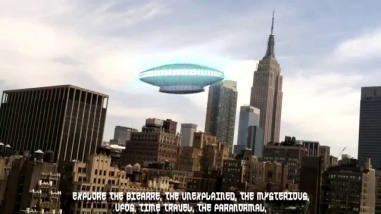
Mr. UFOs Secret Files on YouTube
“You’ve got to have some decent equipment at home,” he said. “You’ve got to have Skype, as I said earlier, because a telephone conversation just won’t sound as good. You should make sure your Skype is working, of course, but if not, a producer like Tina should be there to help you. Whoever is engineering the program, five minutes before the program starts you get on with them and they place the call to your guests by telephone or Skype. You check your voice level and make sure everything is working. This all makes for a much smoother performance, a show that people will want to listen to. It’s very important that you have something that people will tell their friends about. If you give them a couple of ‘sad sack’ or crappy shows, forget about it.”
You must also see to it that you’re in a quiet environment free of ambient noise.
“Make sure to place your device, your microphone and all, somewhere in the room where you’re not going to hear the sound of a refrigerator or an air conditioner or a fan or the toilet flushing,” Beckley advised. “Of course, all radio stations have a soundproof audio room that they do the broadcasting from. Some people set up shop in their basement, where they can section off a wall or two. They make a little room or cubbyhole, set it up as their broadcast facility, and make it soundproof.
“You don’t necessarily have to go to that extent. You just want to make sure you’re not getting feedback. You can get a background hum from something like air conditioning, but also, if you’re using a Kindle or some similar device, and you have it plugged in so the battery doesn’t drain, there’s a chance you’re going to get a humming sound from just the electrical wiring. So it’s actually best, if you’re using a mobile device, not to have it plugged in. If your battery will last for an hour or two, by all means do it without an electrical connection, because that way you won’t get a problem with a ground or a short or something that causes some disturbance on the line.”
So there you have it. Timothy Green Beckley’s advice on podcasting your own show, paranormal or otherwise, “from soup to nuts,” as the saying goes. Podcasting can open up new markets for your work and help you to promote many a worthy book, author, researcher, idea or point of view. But one shouldn’t enter the competitive fray without first seeing to the important details involved in doing your show right. Your future listeners, and maybe an ultra-terrestrial or two, will thank you for it.
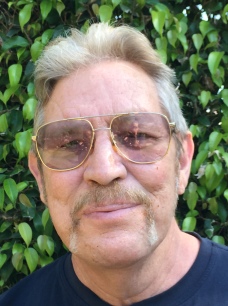
Sean Casteel
SUGGESTED WEBSITES TO VISIT: